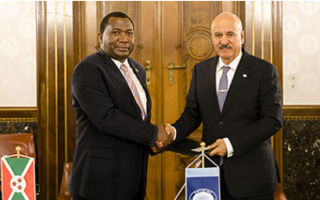Burundi to improve key road with new OFID loan
We can look for money from Middle East countries to become reality your project, even your idea if we believe in it and we develop a project with you for it. As we have done for our project Navigable Agriculture.
THIS NEW FROM The OPEC Fund for International Development (OFID)
OFID Director-General Suleiman J Al-Herbish and HE Dr Domitien Ndihokubwayo, Minister of Finance, Budget and Privatization of Burundi, have signed a US$15m public sector loan agreement for the Gakuba Road Upgrading Project. Around 200,000 inhabitants will benefit from an improved transport of inputs, agricultural produce and livestock and enable them to reach vital social services, thereby raising living standards and incomes.
During the signature ceremony, Al-Herbish spoke about the impact of the project, and spoke of his pride in being a partner, along with co-financiers BADEA and the Saudi Fund for Development, in implementing such an important undertaking. He also expressed OFID’s satisfaction with its level of cooperation with Burundi and reiterated the institution’s support of government’s poverty reduction strategies and aim to provide underserved provinces with paved roads.
HE Ndihokubwayo thanked the Director-General for OFID’s contribution to poverty alleviation in Burundi, referring to their partnership that had spanned over 40 years. The Minister also praised OFID for its work in fighting energy poverty, pointing out that energy was key to his country’s development plan as it contributed to the wellbeing of the population and was crucial for encouraging investments. He concluded by inviting Mr Al-Herbish to visit Burundi to witness, on the ground, the developmental impact of OFID’s co-financed projects.
Works to be carried out under the present project include paving a 35km portion of the national RN16 that crosses the Bururi and Gitega provinces and connects the country’s south and central regions.
OFID’s first approval to Burundi was balance of payments support in 1976. Subsequent public sector loans and grants of nearly US$192m have been approved in the areas of agriculture, education, energy, health, transportation, and water supply and sanitation, among others. The country has also received regional and national grants in the areas of HIV/AIDS mitigation, agricultural research, rural electrification, refugee integration and water supply and sanitation, among others.

